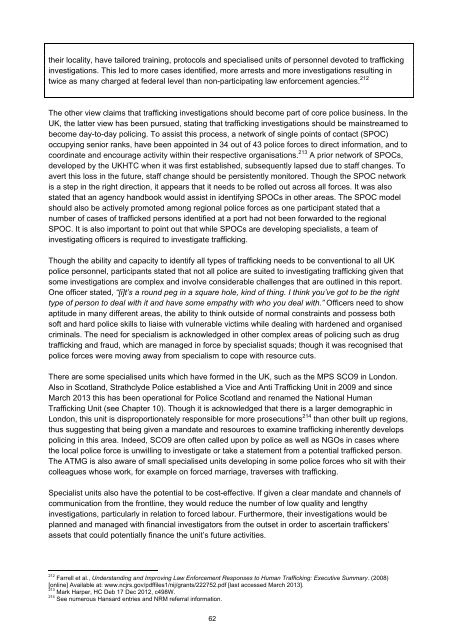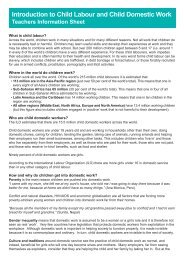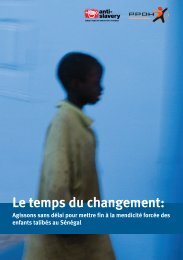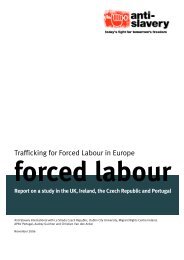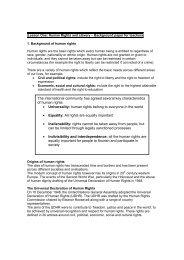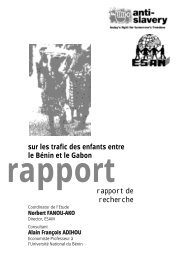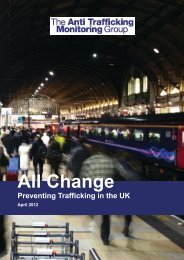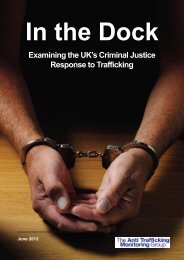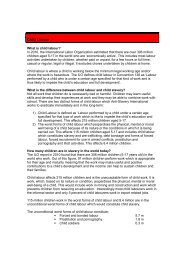<strong>the</strong>ir locality, have tailored training, protocols and specialised units of personnel devoted to traffickinginvestigations. This led to more cases identified, more arrests and more investigations resulting intwice as many charged at federal level than non-participating law enforcement agencies. 212The o<strong>the</strong>r view claims that trafficking investigations should become part of core police business. <strong>In</strong> <strong>the</strong>UK, <strong>the</strong> latter view has been pursued, stating that trafficking investigations should be mainstreamed tobecome day-to-day policing. To assist this process, a network of single points of contact (SPOC)occupying senior ranks, have been appointed in 34 out of 43 police forces to direct information, and tocoordinate and encourage activity within <strong>the</strong>ir respective organisations. 213 A prior network of SPOCs,developed by <strong>the</strong> UKHTC when it was first established, subsequently lapsed due to staff changes. Toavert this loss in <strong>the</strong> future, staff change should be persistently monitored. Though <strong>the</strong> SPOC networkis a step in <strong>the</strong> right direction, it appears that it needs to be rolled out across all forces. It was alsostated that an agency handbook would assist in identifying SPOCs in o<strong>the</strong>r areas. The SPOC modelshould also be actively promoted among regional police forces as one participant stated that anumber of cases of trafficked persons identified at a port had not been forwarded to <strong>the</strong> regionalSPOC. It is also important to point out that while SPOCs are developing specialists, a team ofinvestigating officers is required to investigate trafficking.Though <strong>the</strong> ability and capacity to identify all types of trafficking needs to be conventional to all UKpolice personnel, participants stated that not all police are suited to investigating trafficking given thatsome investigations are complex and involve considerable challenges that are outlined in this report.One officer stated, “[i]t’s a round peg in a square hole, kind of thing. I think you’ve got to be <strong>the</strong> righttype of person to deal with it and have some empathy with who you deal with.” Officers need to showaptitude in many different areas, <strong>the</strong> ability to think outside of normal constraints and possess bothsoft and hard police skills to liaise with vulnerable victims while dealing with hardened and organisedcriminals. The need for specialism is acknowledged in o<strong>the</strong>r complex areas of policing such as drugtrafficking and fraud, which are managed in force by specialist squads; though it was recognised thatpolice forces were moving away from specialism to cope with resource cuts.There are some specialised units which have formed in <strong>the</strong> UK, such as <strong>the</strong> MPS SCO9 in London.Also in Scotland, Strathclyde Police established a Vice and Anti Trafficking Unit in 2009 and sinceMarch 2013 this has been operational for Police Scotland and renamed <strong>the</strong> National HumanTrafficking Unit (see Chapter 10). Though it is acknowledged that <strong>the</strong>re is a larger demographic inLondon, this unit is disproportionately responsible for more prosecutions 214 than o<strong>the</strong>r built up regions,thus suggesting that being given a mandate and resources to examine trafficking inherently developspolicing in this area. <strong>In</strong>deed, SCO9 are often called upon by police as well as NGOs in cases where<strong>the</strong> local police force is unwilling to investigate or take a statement from a potential trafficked person.The ATMG is also aware of small specialised units developing in some police forces who sit with <strong>the</strong>ircolleagues whose work, for example on forced marriage, traverses with trafficking.Specialist units also have <strong>the</strong> potential to be cost-effective. If given a clear mandate and channels ofcommunication from <strong>the</strong> frontline, <strong>the</strong>y would reduce <strong>the</strong> number of low quality and lengthyinvestigations, particularly in relation to forced labour. Fur<strong>the</strong>rmore, <strong>the</strong>ir investigations would beplanned and managed with financial investigators from <strong>the</strong> outset in order to ascertain traffickers’assets that could potentially finance <strong>the</strong> unit’s future activities.212Farrell et al., Understanding and Improving Law Enforcement Responses to Human Trafficking: Executive Summary. (2008)[online] Available at: www.ncjrs.gov/pdffiles1/nij/grants/222752.pdf [last accessed March 2013].213Mark Harper, HC Deb 17 Dec 2012, c498W.214See numerous Hansard entries and NRM referral information.62
Priority planningA particular issue which all law enforcement interviewees presented as pivotal is that trafficking is alow priority policing area, despite <strong>the</strong> Government stating that its, “commitment to tackling humantrafficking is clear and unequivocal”. 215 It was stated by law enforcement participants that if <strong>the</strong> case isnot large in scale or particularly horrific in its facts <strong>the</strong>n it is not given priority. The Home Secretarysets annual national objectives and direct performance targets for police forces. 216 The prioritiesusually stem from areas that <strong>the</strong> public or <strong>the</strong> UK Government considers to be areas of concern - forexample, high priorities relate to burglary, anti-social behaviour and disorder, vehicle crime, robberyand drug-related crime. <strong>In</strong> addition serious and organised crime is prioritised; however, humantrafficking is not explicit under this category. Reflecting <strong>the</strong>se national objectives are annual localpolice plans or control strategies toge<strong>the</strong>r with local policing objectives. 217 As human trafficking is nota prescribed category, it is only reflected in a small number of local policing plans. One lawenforcement interviewee stated:“They would point at <strong>the</strong>ir strategic documents and say ‘… we have a priority in terms of serious andorganised crime’ which is true and, yes, of course, human trafficking falls under that but you can betthat most police forces are actually looking at o<strong>the</strong>r areas of serious organised criminality, drugrunning, gun running, etc.”Respondents discussed <strong>the</strong> strong police performance culture and <strong>the</strong> pressures from management toperform in priority areas which have dedicated resources. Statistics in effect were said to divert a lot ofpolicing as figures were often pursued ra<strong>the</strong>r than crime reduction. 218 <strong>In</strong> 2011, during an unfairdismissal case made by a police officer against her employer, 219 one of <strong>the</strong> allegations put forwardwas that senior management concealed <strong>the</strong> scale of trafficking because <strong>the</strong>y were concerned thattrafficking investigations involved more resources and would leave <strong>the</strong>m unable to meet crimedetection targets. During <strong>the</strong> tribunal hearing, which was found in favour of <strong>the</strong> claimant, it was statedthat this focus on measurable targets led to an incident in 2007 where <strong>the</strong> lives of two traffickedwomen were put in jeopardy. Though this incident occurred in 2007, this case highlights <strong>the</strong> adverseeffect policing priorities can have on trafficking.Respondents claim that if <strong>the</strong>y had <strong>the</strong> backing from senior management, forces would be able todevote time and resources to trafficking investigations. One participant stated that if trafficking,including for forced criminality, was made a priority, this would decrease <strong>the</strong> number of petty crimescommitted. Prosecuting a trafficker who may be forcing a group of trafficked persons to commit crimeswill inevitably see such crimes decrease in areas <strong>the</strong> trafficker operates. Moreover, trafficking shouldbe made a police priority as it may disadvantage UK businesses, undermines public services throughtax evasion and puts pressure on health, judicial and welfare systems.The introduction of <strong>the</strong> Police and Crime Commissioner (PCC) in 2012 is both an opportunity and aconcern in setting trafficking as a policing priority. With <strong>the</strong> aim “[t]o provide stronger and moretransparent accountability of <strong>the</strong> police, PCCs will be elected by <strong>the</strong> public to hold chief constablesand <strong>the</strong> police force to account; effectively making <strong>the</strong> police answerable to <strong>the</strong> communities <strong>the</strong>yserve.” 220 PCCs are responsible for setting local policing priorities but must have regard to those setby <strong>the</strong> Home Secretary. Whilst <strong>the</strong> PCC model offers lobbying opportunities to prioritise trafficking,215HM Government, Human Trafficking: The Government’s Strategy (July 2011), p.4.216Newburn, supra note 168.217Ibid.218A recent example of such come from <strong>the</strong> MPS Southwark Sapphire Unit in south London whose officers "encouraged" victims towithdraw allegations to boost detection rates. See BBC News, ‘Met rape unit encouraged woman to drop case against murderer’ BBCNews London 26 February 2013 [online]. Available at: www.bbc.co.uk/news/uk-england-london-21586786 [last accessed 23 April2013].219.Jones. C., ‘Sex-traffic case detective wins payout from force: Victory for <strong>the</strong> Detective in Whistle-Blower Tribunal’ Western Mail(Cardiff, Wales) April 8, 2011.220Home Office, Raising awareness and understanding of Police and Crime Commissioners: A handbook for police communicators(August 2012 ), p.3. Available at: www.gov.uk/government/uploads/system/uploads/attachment_data/file/117510/communicationshandbook.pdf[last accessed March 2013].63
- Page 1 and 2:
In the DockExamining the UK’s Cri
- Page 3 and 4:
AcknowledgementsThis report was mad
- Page 5 and 6:
PrefaceIn May 2009, a group of nine
- Page 7 and 8:
Misconceptions around exploitation
- Page 9 and 10:
Acronyms and abbreviations frequent
- Page 11 and 12:
Executive SummaryIn the Dock is The
- Page 13 and 14: Furthermore, the current legislatio
- Page 15 and 16: The ATMG was made aware of some cas
- Page 17 and 18: • Introduce mandatory child-speci
- Page 19 and 20: • The UK’s ability to meet the
- Page 21 and 22: Traffickers’ primary motivation i
- Page 23 and 24: • Money launderers - turn profits
- Page 25 and 26: out to perpetuate the exploitative
- Page 27 and 28: [their] own enslavement” is as fu
- Page 29 and 30: Chapter 2: UK Anti-Trafficking Legi
- Page 31 and 32: nationals who commit trafficking of
- Page 33 and 34: Like the SOA, the “act” element
- Page 35 and 36: (b) D requires another person to pe
- Page 37 and 38: Forced or compulsory labourThe defi
- Page 39 and 40: ConclusionAs a consequence of the s
- Page 41 and 42: concerningly, the number of convict
- Page 43 and 44: women who were recruited in Poland
- Page 45 and 46: Chapter 4: Identifying trafficking
- Page 47 and 48: Misconceptions around exploitationT
- Page 49 and 50: espond inadequately to a trafficked
- Page 51 and 52: multi-agency teams was described by
- Page 53 and 54: Josie Connors. 179 In summary, inte
- Page 55 and 56: defending a trafficked person for f
- Page 57 and 58: “[B]ecause the NRM decision is on
- Page 59 and 60: PTSD. 196 A Consultant Psychiatrist
- Page 61 and 62: etween the client and the police, i
- Page 63: Regular communication needs to be s
- Page 67 and 68: Chapter 6: Multi-agency and interna
- Page 69 and 70: canvassing for tarmacking opportuni
- Page 71 and 72: Despite this, it would appear that
- Page 73 and 74: Good practice - Operation Golf 229O
- Page 75 and 76: Chapter 7: Criminal proceedingsThe
- Page 77 and 78: Law enforcement working on the case
- Page 79 and 80: trafficking require particular unde
- Page 81 and 82: JuryPractitioners suggested that th
- Page 83 and 84: years”. 258 Ambiguity within the
- Page 85 and 86: officer stated that not all judges
- Page 87 and 88: jurors to be assisted with expert e
- Page 89 and 90: Good feedback was received from sem
- Page 91 and 92: The Convention does recognise that
- Page 93 and 94: Another option for trafficked victi
- Page 95 and 96: There are two models with respect t
- Page 97 and 98: 1. Is there clear evidence that the
- Page 99 and 100: decision can be taken into account
- Page 101 and 102: also entails being “alert to the
- Page 103 and 104: In some cases concerns were even ra
- Page 105 and 106: Chapter 9: Prosecuting child traffi
- Page 107 and 108: However, many children are not refe
- Page 109 and 110: trafficking”. 352 It states: “W
- Page 111 and 112: Previous research has found that th
- Page 113 and 114: children as well as assisting in pr
- Page 115 and 116:
Child trafficking trainingThere is
- Page 117 and 118:
were too traumatic to involve them
- Page 119 and 120:
committed by a child whilst in a co
- Page 121 and 122:
• Introduce mandatory child-speci
- Page 123 and 124:
IdentificationThe PSNI is the main
- Page 125 and 126:
participants suggest that this is b
- Page 127 and 128:
The PPS stated that the reasons for
- Page 129 and 130:
this research was aware of potentia
- Page 131 and 132:
convictions of traffickers prosecut
- Page 133 and 134:
Possibly in response to certain hur
- Page 135 and 136:
espectively. In addition to custodi
- Page 137 and 138:
Conclusion and RecommendationsThe A
- Page 139 and 140:
CRIMINAL PROCEEDINGS• Ensure that
- Page 141 and 142:
Crown Prosecution Service, Legal Gu
- Page 143 and 144:
Herman. J. Trauma and Recovery: The
- Page 145 and 146:
Annex I: Trafficking and other form
- Page 147 and 148:
(a) on summary conviction, to impri
- Page 149 and 150:
(b) which country is the country of
- Page 151 and 152:
2009 Istvan Kalocsai (Snr)MetS.57 o
- Page 153 and 154:
2009 causing actual bodily harm, su
- Page 155 and 156:
Skirmantas Kvedaras Feed, 2010 Rape
- Page 157 and 158:
2012 Ahdel Ali (24)Mubarek Ali (29)
- Page 159 and 160:
Annex III: The CPS’s Seven Stages
- Page 161 and 162:
159


